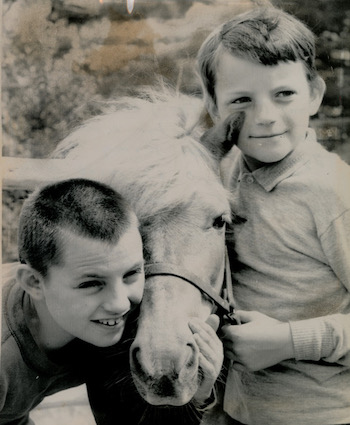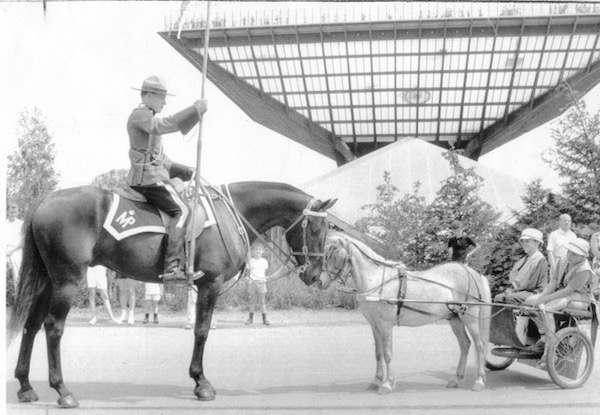Filmmaker Interview: Arlington’s Eric Stange on his Documentary “Pony Boys”
By Glenn Rifkin
This is a delightful and moving tale that provides a much-needed bit of relief from the chaotic world we are currently navigating. Back before there was iPhones and social media, two little boys took off on an unlikely adventure that changed their lives.
About a dozen years ago, filmmaker Eric Stange had a conversation with his neighbor in Arlington. The neighbor told Stange that another neighbor, Jeff Whittemore, who lived a few doors down the street, had related a story that seemed impossible to believe. In 1967, when Whittemore was 9, he and his 11-year-old brother Tony, left their home in Needham in a homemade two-wheeled horse cart being towed by a tiny 10-year-old Shetland pony named King, and made their way alone on a 27-day, 350-mile journey to Montreal to attend Expo 67, the city’s World’s Fair.
Stange later met Jeff Whittemore and heard the story firsthand. The boys, encouraged by their slightly unconventional mother, did indeed make this unusual trek to Montreal in July 1967. Crazy but true, the story begged for a retelling and Stange pledged that one day he would get in touch to make a film.
But Stange, a documentary filmmaker who specializes in history and science films for PBS, got busy with other projects such as Edgar Allan Poe: Buried Alive (Arts Fuse review); Unnatural Causes: Is Inequality Making Us Sick?; The War That Made America; Murder at Harvard and many others. So the Whittemore idea was pushed to a very far backburner.
A couple of years ago, Stange, who was semi-retired and far choosier about his projects, decided to revisit the pony cart story. “If I’m ever going to do this, now is the time,” he thought. He invited Jeff to his house to talk about a film. Whittemore brought a scrapbook his mother had made of the odd odyssey and Stange filmed a preliminary interview. Within a week of the interview in March 2020, Covid-19 shut down the world.
With nothing but the scrapbook and the footage of the interview, Stange spent the next six months editing the film, searching for material on Google, and realized he had enough to start his film. When Covid subsided long enough for a safe encounter, Stange visited Tony Whittemore at his home in Webster, Mass and filmed a long interview. An older sister, Wendy, visited Jeff in Arlington and agreed to an interview at Stange’s house. With those three interviews in the can, Stange set out to finish Pony Boys, a 24-minute short documentary that had its premiere at the Independent Film Festival at the Somerville Theater at the end of April.
Stange spoke to Arts Fuse about the film, a delightful and moving tale that provides a much-needed bit of relief from the chaotic world we are currently navigating. Back before there was iPhones and social media, two little boys took off on an unlikely adventure that changed their lives.

Jeff and Tony Whittemore at the time of their great adventure. Photo: Eric Stange.
Arts Fuse: Did you envision this film as a short documentary from the beginning?
Eric Stange: I always thought it was a short film that couldn’t be stretched out. The story could be told in a short time because, as Jeff told me, nothing really happened. If something terrible had happened, it would have been different.
AF: Other than the interviews with the boys and their sister, you didn’t have a great deal to work with.
Stange: I had the scrapbook, some photos and articles. You can use a certain amount of newspaper articles in a film, but they don’t really show up that well. I hired an archival researcher, a friend named Heather Merrill, who does great work, and she found the Associated Press newsreel that really made the film work. They had sent a film crew to spend a full day with the boys and made a color film. We used every second of that film. It was representative of the whole trip because things weren’t that different from day to day. The footage brings the story alive.
AF: You open the film with a segment from the old TV show To Tell the Truth. That was certainly a surprise.
Stange: As soon as they remembered being on To Tell the Truth, that was the first archival footage we found. I realized that it was the way to begin the film because it kind of suggests what the film is about. Once I had that, it just came together. The harder part was weaving the story together and keeping a little tension. Obviously, they made it to Montreal and you know that from the beginning. But I wanted to keep some suspense.
AF: As you watch it, you wonder what kind of parents would have allowed two little boys to do something like that. If anything, 1967 was a more dangerous time than today.
Stange: Yes, the question was clearly what kind of parenting is that? The father went along reluctantly but their mother was a really unusual mother. The brothers told me other stories about her and she really did give her kids a very long leash. She thought it was good for them. She made sure they did as much prep as they could and she was keeping tabs on them, one way or another, along the way. There were no cell phones but she was trailing behind in one form or another.
AF:The fact that she showed up pretty quickly at the Canadian border illustrated that.
Stange: Yeah, the boys didn’t know she was going to be there and they were a little surprised. They were worried about what would happen since they were minors and had no money. How would they get across the border? But she got there within a couple of hours and was able to get them through. You have to remember the drive from Needham to Montreal is only about five hours, so she could never have been that far way if they needed her.
AF: Nonetheless, she and her husband received a lot of flak for questionable parenting.
Stange: Yes. But Tony told me that by halfway through the trip, there was so much press and people in every town were waiting to cheer for them and feed them and give them places to stay, that they were probably the safest kids in America.
AF: The response was really something.
Stange: That was their most vivid memory of the trip, that people were so nice to them. Their original plan had been to work for room and board along the way. They would find a farm and do chores in exchange for a place to pitch their tent and graze the pony. Instead, people were vying to have them stay at their homes and they never had to work at all.

The Whittemore expedition meets a Canadian Mountie. Photo: Eric Stange
AF: You weren’t able to find much about their arrival at Expo 67, which apparently was a big deal.
Stange: Yeah, that was weird. There was a big press conference when they arrived. Their family was there waiting for them. There were radio and television interviews and press photographers, and we couldn’t find anything. We tried all sources and came up with a single photograph of Tony. But we managed to recreate the feeling pretty well.
AF: The unsung hero of the film is King, the Shetland pony.
Stange: They told me that King was the adult on the trip. He knew what to do before they did. They took very good care of him and there were veterinarian examinations along the way. The pony cart was so small and very light and they were only going five miles an hour. They got out on hills and pushed it to help King. He lived to be 37 years old.
AF: How will people be able to see this film?
Stange: We are entering it in a lot of film festivals and I think it will do pretty well. It will be screened at the Martha’s Vineyard Film Festival, May 18-22, and there will be other New England festival screenings over the next few months. We’re also looking at various streaming services, like Apple TV, which will take short documentaries. One way or another, it should be available within six months.
Glenn Rifkin is a veteran journalist and author who has covered business for many publications including the New York Times for nearly 30 years. He has written about music, film, theater, food and books for the Arts Fuse. His new book Future Forward: Leadership Lessons from Patrick McGovern, the Visionary Who Circled the Globe and Built a Technology Media Empire was recently published by McGraw-Hill.
Tagged: " Eric Stange, Expo 67, Jeff Whittemore, New England, documentary, documentary short

Thanks, Glenn, for taking a short film seriously enough for an excellent interview with the director, Eric Stange. Eric is one of our best local filmmakers, and I would add that the film is edited by a local treasure for her many films, Rachel Clark.
How did they get home?
I teach a course called “Triumph of the Human Spirit.” This will now be one of the stories!
(Former Outward Bound instructor and director, former college president…)